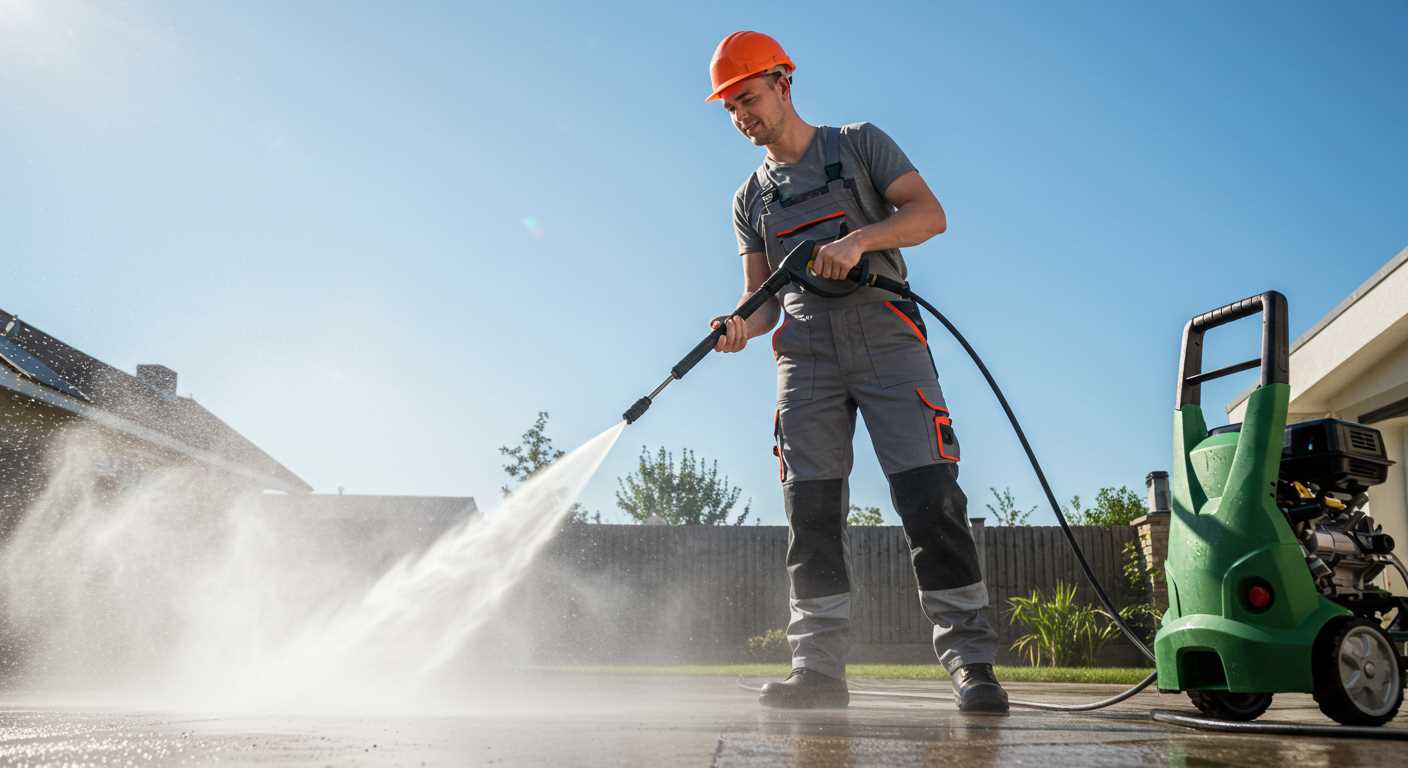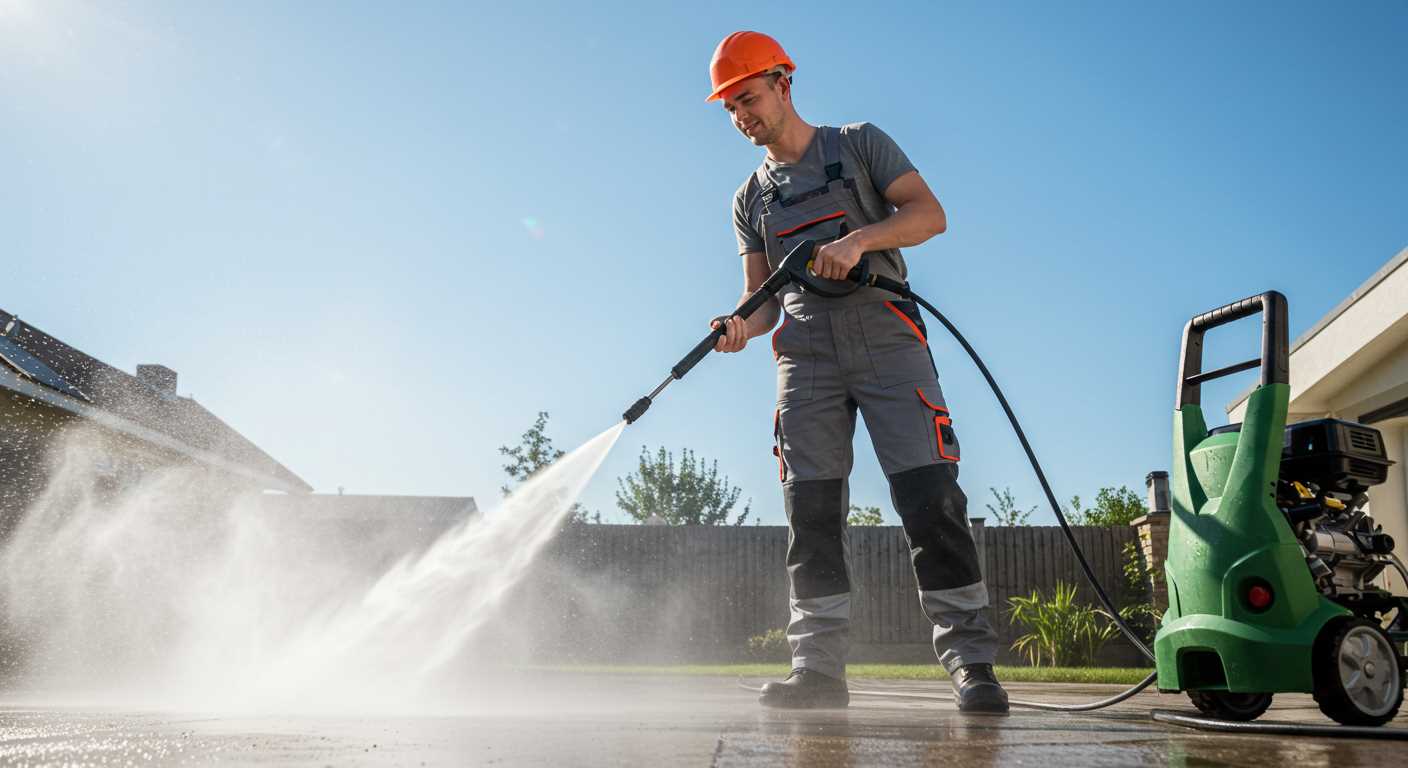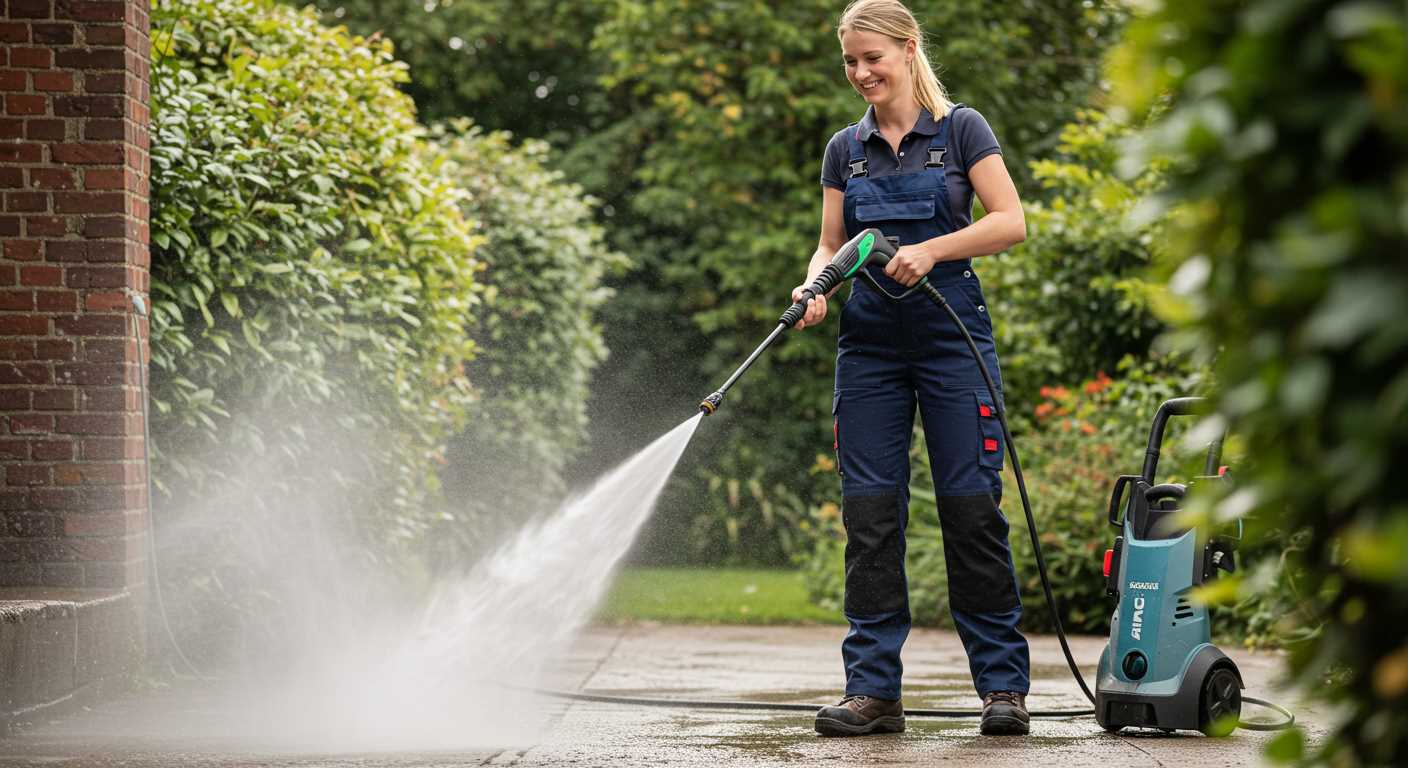




If you’re looking to enhance your cleaning tasks, a dedicated cleaning agent specifically designed for high-pressure equipment is your best bet. I’ve personally tested many formulations over the years, and I can confidently recommend using biodegradable options that are safe for both surfaces and the environment. Products rich in surfactants work wonders, breaking down grime and grease without damaging delicate surfaces.
One effective choice is a citrus-based cleaner. These formulations are fantastic for removing oil and grease, thanks to their natural solvents. I remember tackling a particularly greasy driveway; using a citrus cleaner made all the difference, cutting through the muck effortlessly while leaving a pleasant scent behind.
For tough stains, consider a specially formulated alkaline cleaner. During one of my product tests, I used an alkaline solution on a heavily soiled patio. The results were remarkable; the cleaner lifted years of dirt with minimal effort, showcasing how powerful the right solution can be.
Lastly, always ensure that the chosen cleaning agent is compatible with your equipment. Some models have specific requirements regarding the type of substances that can be used. Once, I mistakenly used a harsh chemical that damaged the internal components of my device, leading to costly repairs. A simple check of the manufacturer’s guidelines could have saved me that hassle.
Recommendations for Detergents in High-Pressure Cleaners
For optimal results, choose a detergent formulated specifically for high-pressure cleaning devices. These products often contain surfactants and biodegradable components that enhance cleaning efficiency without damaging surfaces. Always read the manufacturer’s guidelines for compatibility.
Types of Detergents Suitable for High-Pressure Equipment
Based on my extensive experience, here are some categories of cleaners that work well:
| Type | Description | Recommended Uses |
|---|---|---|
| Alkaline Cleaners | Effective at breaking down grease and oil. | Driveways, garages, and outdoor furniture. |
| Acidic Cleaners | Remove mineral deposits and rust. | Patios and stone surfaces. |
| Biodegradable Cleaners | Environmentally friendly options that are safe for all surfaces. | General cleaning for homes and vehicles. |
| Foaming Cleaners | Provide better cling, allowing more time for dirt to dissolve. | Car washing and vertical surfaces. |
Considerations for Choosing Detergents
Always ensure that the cleaner is compatible with your equipment. Some models may require specific formulations to avoid warranty issues. Additionally, I recommend testing a small area before full application to check for any adverse reactions. For those looking for commercial-grade options, explore the best commercial pressure washers to find suitable machines that work harmoniously with a variety of detergents.
Types of Soap Suitable for Pressure Washers
Start with a pH-neutral formulation. These are gentle yet effective, making them ideal for various surfaces, including painted areas and vehicles. I’ve had great success using this type during my years in the field, especially when dealing with delicate finishes.
Degreasers
For heavy-duty tasks, opt for degreasers. They tackle stubborn oil and grease effectively. I recall a time when a client needed to clean a workshop floor coated in grime. A concentrated degreaser mixed with water in the reservoir worked wonders, bringing the surface back to life.
Biodegradable Options
Eco-friendly alternatives are gaining popularity. These formulations are safe for the environment and still deliver impressive cleaning results. I often recommend them for outdoor use, particularly around gardens and lawns. Using biodegradable solutions not only protects the surroundings but also aligns with sustainable practices.
When selecting a cleaner, ensure it’s compatible with your device’s specifications. Always read product labels for guidance on dilution ratios and surface compatibility. Proper maintenance of your equipment will extend its lifespan and maintain optimal performance.
How to Choose the Right Soap for Your Cleaning Task
For optimal results, select a cleaner that matches the surface type and the type of grime you’re tackling. For instance, if you’re dealing with mildew on outdoor furniture, a mildew remover is your best bet. Conversely, for oil stains on driveways, a degreaser formulated for tough grease works wonders.
Consider the formulation as well. Some products are concentrated and need to be diluted, while others are ready to use right out of the bottle. I remember one time using a highly concentrated blend, only to find out I had mixed it too weak. The results were lacklustre, so now I always check the instructions before mixing.
Pay attention to environmental factors. If you’re cleaning near plants or sensitive areas, opt for biodegradable options. I once used a standard cleaner without thinking, and it harmed my garden. Lesson learned: always check labels for eco-friendliness.
Check compatibility with your equipment. Some formulations may require specific nozzles or pressure settings. I’ve had instances where I assumed a cleaner would work with my model, only to discover it gummed up the system. Always consult your equipment manual or the manufacturer’s recommendations.
Lastly, read customer reviews. They can provide insights into the product’s performance and any potential pitfalls. I often rely on these firsthand accounts to gauge whether a cleaner lives up to its claims. A well-reviewed product can save time and effort in the long run.
Compatibility of Soaps with Different Pressure Washer Models
Choosing the right cleaning agent for your machine largely depends on its make and model. For instance, many consumer-grade devices from brands like Karcher or Ryobi are designed to work best with specially formulated mixtures that they produce. Using generic or harsh chemicals can void warranties and lead to damage.
When it comes to commercial units, like those from Honda or Generac, these often have more robust systems that can handle a wider range of cleaning formulations. However, it’s still advisable to stick with products that are recommended by the manufacturer to ensure optimal performance.
I’ve encountered situations where users thought they could use automotive detergents or household cleaners, only to find their machines clogged or damaged. It’s crucial to check the user manual or consult the manufacturer’s website for a list of compatible agents.
For those looking to use a foaming solution, devices equipped with a foam cannon can typically handle a variety of mixtures. However, always ensure that the foam is compatible with your specific model to avoid issues. I’ve seen foaming agents that worked wonders on one machine but caused significant problems on another due to varying pressure settings and nozzle types.
In my experience, biodegradable and eco-friendly options are often a safe bet across different machines. They tend to be milder and less likely to cause harm while still providing effective cleaning results. I recall using a plant-based cleaner in a high-end unit, and not only did it perform excellently, but it also left a pleasant scent.
Always remember to conduct a patch test if you’re uncertain about how a specific agent will react with your device. A small area can reveal potential compatibility issues without risking the integrity of the entire system. Trust me, taking this precaution can save a lot of headaches down the line.
Using Biodegradable Soaps for Eco-Friendly Cleaning
Choosing biodegradable formulations not only aids in preserving the environment but also provides effective cleaning without harmful residues. Over the years, I’ve tested various eco-friendly options that maintain the power needed for tough jobs while being gentle on nature.
Benefits of Biodegradable Cleaners
- Less environmental impact due to non-toxic ingredients.
- Safe for plants and wildlife, making them suitable for outdoor use.
- Usually derived from natural sources, leading to fewer synthetic chemicals in your cleaning routine.
Recommendations for Effective Use
When selecting a biodegradable cleaner, consider the following:
- Ensure compatibility with your equipment. Some formulations may foam excessively or clog the system.
- Look for certifications that guarantee environmental safety, such as the EPA’s Safer Choice label.
- Test on a small area first to ensure it meets your cleaning standards without damaging surfaces.
One memorable experience was using a plant-based cleaner on my patio. The results were impressive, with dirt and grime disappearing without any negative effects on the surrounding garden. It’s rewarding to achieve a clean space while being mindful of the planet.
Tips for Mixing Detergent with Water in a High-Pressure Cleaner
Start with the right ratio. A common guideline is to mix one part detergent with four parts water, but always consult the product label for specific instructions. Using too much cleaning agent can lead to excessive suds, which may clog the system and hinder performance.
It’s best to mix in a separate container before adding to the tank. This ensures a thorough blend and prevents clumping, which can occur if you add powder directly into the tank. If using a liquid formula, pour it slowly while stirring to achieve an even consistency.
Temperature Considerations
Warm water can enhance the effectiveness of many cleaning agents. If your model allows for hot water, try using it for tougher stains or grime. Just be cautious not to exceed the manufacturer’s temperature limits, as this can damage components.
Testing Before Full Application
Before tackling a large area, do a test patch in an inconspicuous spot. This allows you to check for any adverse reactions between the mixture and the surface. Adjust the concentration if necessary to ensure optimal results without damaging the material being cleaned.
Common Mistakes When Using Cleaning Agents in High-Pressure Units
One of the most frequent errors I’ve observed during my years of working with high-pressure equipment involves improper mixing of cleaning agents. Many users tend to add too much concentrate, thinking it will enhance the cleaning process. Instead, this can lead to residue build-up and can even damage your machine.
- Neglecting Manufacturer Guidelines: Always refer to the user manual for recommendations on compatible cleaning products. Ignoring this can void your warranty.
- Using Household Products: Some individuals mistakenly believe that household cleaners are suitable for these machines. Most of these products are too harsh and may cause harm to the internals of your device.
- Forgetting to Rinse: After applying your chosen cleaner, skipping the rinse phase can leave behind a film, attracting dirt and grime more quickly.
- Incorrect Nozzle Selection: Using a nozzle that is too narrow while applying a cleaning solution can cause the mixture to spray too vigorously, leading to splatter and ineffective cleaning.
- Inadequate Dilution: Failing to dilute properly can lead to excessive foam that clogs the system, making it difficult to operate efficiently.
During my work, I once encountered a colleague who consistently ignored dilution ratios. His machine frequently experienced issues, requiring expensive repairs. Once he changed his approach and followed guidelines, the problems ceased, and his cleaning tasks became much easier.
Another common oversight is the lack of compatibility checks with various models. Always ensure your chosen cleaning solution is suitable for your specific machine. For instance, a battery powered high pressure washer may have different requirements compared to traditional electric units.
- Skipping Protective Gear: When handling concentrated agents, not wearing gloves or protective eyewear is a significant risk. Always prioritise safety.
- Improper Storage: Storing leftover solutions in direct sunlight or extreme temperatures can degrade their effectiveness. Always keep them in a cool, dark place.
These tips stem from years of trial and error. Avoiding these pitfalls will lead to a smoother and more effective cleaning experience, while prolonging the life of your high-pressure equipment.





.jpg)


